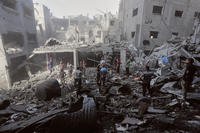A year after the fall of Raqqa, once the seat of the Islamic State's "caliphate," U.S.-backed forces are still struggling to eliminate the determined and elusive last threads of the terror group in Syria's eastern deserts, near the Iraqi border, a coalition military spokesman said Tuesday.
In addition, ISIS fighters are still active in Iraq, as evidenced by recent clashes in Kirkuk and Ramadi, despite the Baghdad government's declaration in December 2017 that Iraq had been "completely liberated" from the Islamic State, said Army Col. Sean Ryan, a spokesman for Combined Joint Task Force-Operation Inherent Resolve.
In a recent clearing operation against ISIS in Ramadi, Iraqi Security Forces found about 1,000 improvised explosive devices that would have targeted the ISF and civilians, Ryan said.
In north-central Kirkuk, small pockets of ISIS still pose a threat, he added.
In Raqqa, residents who have returned are preparing to mark the one-year anniversary of the Oct. 17, 2017, liberation of the town that still-at large ISIS leader Abu Bakr al-Baghdadi declared as his caliphate's capital.
International donors recently delivered 140 metric tons of wheat seed to Raqqa, something Ryan described as a "first beginning to a more peaceful Syria."
"Overall, ISIS is territorially defeated," he said, but the U.S.-backed and mostly Kurdish Syrian Democratic Forces have yet to eliminate ISIS fighters in the Middle Euphrates River Valley. "They're a very resilient enemy, no doubt about that," Ryan said.
Earlier Tuesday, Joint Chiefs Chairman Gen. Joseph Dunford told a security conference that foreign fighters are still entering Syria daily to bolster ISIS ranks. Ryan said ISIS fighters have access to enough food and water and sustain themselves indefinitely.
In defending the lengthy effort to inflict a final defeat on ISIS, Ryan said, "We're degrading them every day," but the SDF "has been methodical in their approach" to moving against the remaining fighters. The advance has been slowed by ISIS' use of a labyrinthine tunnel system and periodic counter-attacks, he said.
Civilians continue to escape from ISIS-held areas. "Make no mistake, ISIS is using these people as human shields," he said.
-- Richard Sisk can be reached at Richard.Sisk@Military.com.












